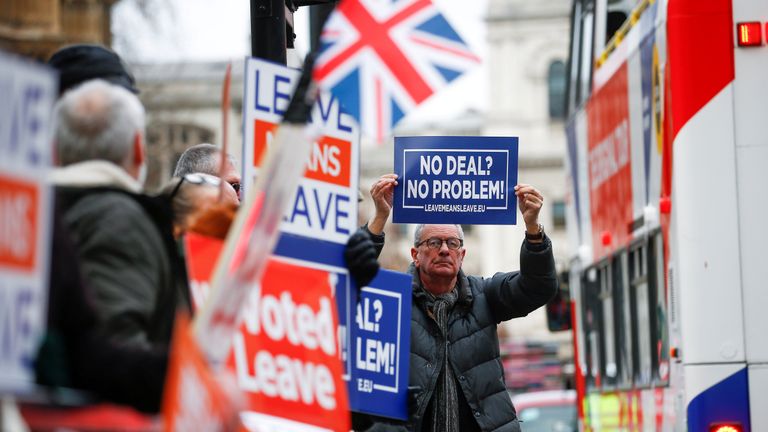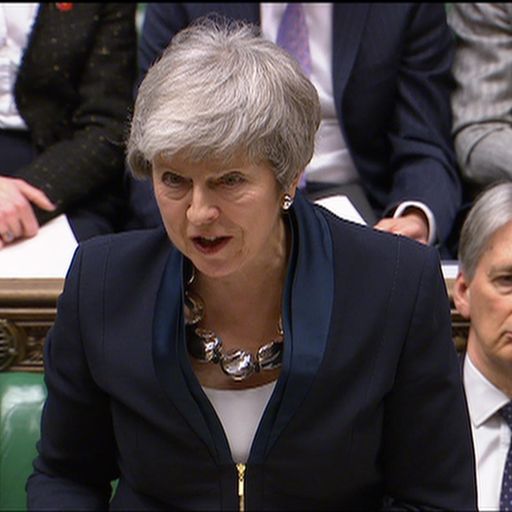Public and businesses are not preparing for a no-deal Brexit, government document says
A government document says "communications to third parties, including many businesses" are "not having the intended effect".
Wednesday 27 February 2019 13:51, UK
Despite warnings of the impact of a no-deal Brexit, members of the public and businesses are not preparing for such a scenario, a government document has said.
A report drawn up for ministers paints a pessimistic picture of preparations for no-deal, noting that a third of the "most critical projects" to get Britain ready for such a scenario are not "on track".
The document, which sets out the implications for businesses and trade if Britain leaves the EU without a deal, also claims warnings are not getting through to businesses and members of the public.
Under the terms of Article 50, the UK will leave by default without an agreement at the end of March if Prime Minister Theresa May is unable to get a revised Brexit deal through Parliament.
On Tuesday, she pledged to give MPs a vote on ruling out no-deal or delaying Brexit through an extension to Article 50 if her deal is defeated a second time around.
This is seen as decreasing the chances of a no-deal Brexit, given the fact that a majority of MPs are known to be against this happening.
However, a no-deal Brexit is still not impossible, with Mrs May telling MPs that an extension to Article 50 "cannot take no-deal off the table".
It is amid this backdrop that the latest no-deal document has been released.
While it notes that there have been "very significant efforts" to prepare for such an outcome, assessments from inside government reveal "the scale of risk remaining in the limited time available".
"In February, departments reported being on track for just under 85% of no-deal projects but, within that, on track for just over two-thirds of the most critical projects," the document said.
The paper adds that part of the reason for this is "communications to third parties, including many businesses" are "not having the intended effect".
It suggests that businesses do not believe no-deal is a viable prospect.
"There is little evidence that businesses are preparing in earnest for a no-deal scenario, and evidence indicates that readiness of small and medium-sized enterprises in particular is low," the report notes.
This apathy extends to members of the public, according to the document, which says people are "not preparing" for the likely impacts of no-deal.
"UK citizens travelling to or living in the EU would need to complete a number of administrative tasks to ensure that their interactions with the EU are as unaffected as possible," it said.
"These range from renewing passports, to applying for a car insurance green card and International Driving Permit to drive in the EU.
"As of February 2019, despite a public information campaign encouraging the public to seek out the government's advice on preparing for a 'no-deal', noticeable behaviour change has not been witnessed at any significant scale."
Other no-deal warnings in the document include:
:: Potential disruption to cross-Channel trade "would lead to reduced availability and choice of products"
:: UK citizens could face longer waits at the border and be excluded from the use of e-gates for passport checks
:: The EU would slap 70% tariffs on beef, 45% on lamb exports and 10% on motor vehicles
:: The total administrative burden on businesses from customs declarations could be around £13bn a year
The document was released after Chuka Umunna and Anna Soubry, members of The Independent Group of MPs, tabled an amendment in the Commons.
Mr Umunna said the contents "paint a disastrous picture of the catastrophe which would befall our country if there is a no-deal Brexit".
"In light of what she knows, it is utterly irresponsible for the prime minister to keep a no-deal Brexit on the table given the extreme damage it will do," the former Labour MP said.
"These papers set out how food prices will rise, we may see panic buying, there will be severe disruption at the border, and jobs and livelihoods would immediately be put at risk."




